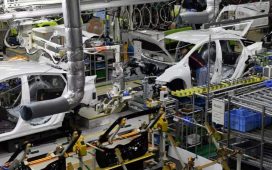Ministers must take control of the UK’s energy system, removing the barriers to planning permission and problems with the national electricity grid, to build the windfarms and other renewable power needed to meet net-zero goals, government advisers have warned.
Chris Stark, chief executive of the committee on climate change, the statutory adviser, said the task was too urgent to wait until after a general election, expected within the next 18 months. “It would be an enormous mistake to wait until the next general election to introduce new ambitious policy,” he said.
He highlighted the planning regime, which effectively prevents onshore windfarms from being built – despite government promises to remove the barriers – and which is one of the factors, along with lack of investment, stymying the construction of connections to the national electricity grid.
The planning regime was “gummed up”, Stark said. “The best response is to get the planning regime, the regulatory regime, and the consenting regime sorted out,” he said.
Stark urged the government to act within the next few weeks, saying there was a “window” as the chancellor of the exchequer delivers the budget next week, and before the end of the month a report is due from ministers on how they will meet the UK’s climate targets. “That is the window, to signal to the investor community that [the UK is] responding in the right way to this crisis, and have plans in place,” he said.
Without clear action from the government, the UK would miss out on vital investment opportunities, he warned, as rivals in the EU, China and the US have been gearing up rapidly for a trade war on green technology. The EU will set out next week plans to achieve its net-zero goals by building up green technology within the bloc, while the US is boosting green industries through its Inflation Reduction Act.
The government’s target of decarbonising the UK’s electricity generation fully by 2035, necessary to meet the long-term goal of reaching net zero greenhouse gas emissions by 2050, was achievable, but not without massive changes, the CCC warned.
Current policies, and the current planning regime, would not achieve the target, the CCC made clear in a report published on Thursday.
“We know how to do this, but the problem is that government is not putting in place the policies needed for it to happen at the pace it needs to,” said Stark. “The system is not ready to deliver change at the scale and pace necessary.”
A small amount of gas-fired power – equivalent to 2% of national electricity generation – would still be needed after 2035, the committee found. This is to ensure security of supply in periods of “wind drought”, when windfarms are not producing sufficient electricity.
As the UK moves to cleaner electric vehicles and heat pumps, demand for electricity is set to rise, by as much as 50% by 2035. Alongside new windfarms, solar power generation and nuclear plants, the UK will need far more capacity to store electricity. That could take the form of large batteries and hydrogen, which can be generated from electricity and stored until needed.
after newsletter promotion
Work on these hydrogen power stations should start now, rather than waiting even a year, the CCC said.
The report also called into question the burning of trees in power stations, calling for any power plant using wood to be fitted with carbon capture and storage technology (CCS), which must happen “as early as feasible”, and ensure that they are not given contracts to operate without such technology beyond 2027. This would apply chiefly to Drax, the UK’s largest biomass power station.
The report set out 25 recommendations, including a new energy infrastructure group, led by a minister, that would take responsibility for decarbonising power; new funding this year to start hydrogen power projects, to be operational by 2030; ensure any new gas-fired power plants are ready for CCS or hydrogen; and to work on CCS technology, including a plan for transporting carbon dioxide.
Jess Ralston, head of energy at the Energy and Climate Intelligence Unit thinktank, said: “There is a huge investment opportunity in a cleaner, cheaper electricity system that isn’t blown about by international gas markets, but government needs a clearer plan for investors to pile in. The additional costs involved in balancing a renewables grid are minimal, particularly when compared to the cost of gas power.”
Caroline Lucas, the Green party MP, pointed to the government’s apparent back-pedalling on a promise to lift the ban on onshore windfarms, and failure to mandate solar panels on new houses. “This report confirms that genuine energy security requires embracing abundant and affordable renewables to cut energy bills as well as carbon emissions. But the government’s current energy policy requires wading through treacle in order to do so – through its own painfully poor planning and agonisingly slow delivery,” she said.











